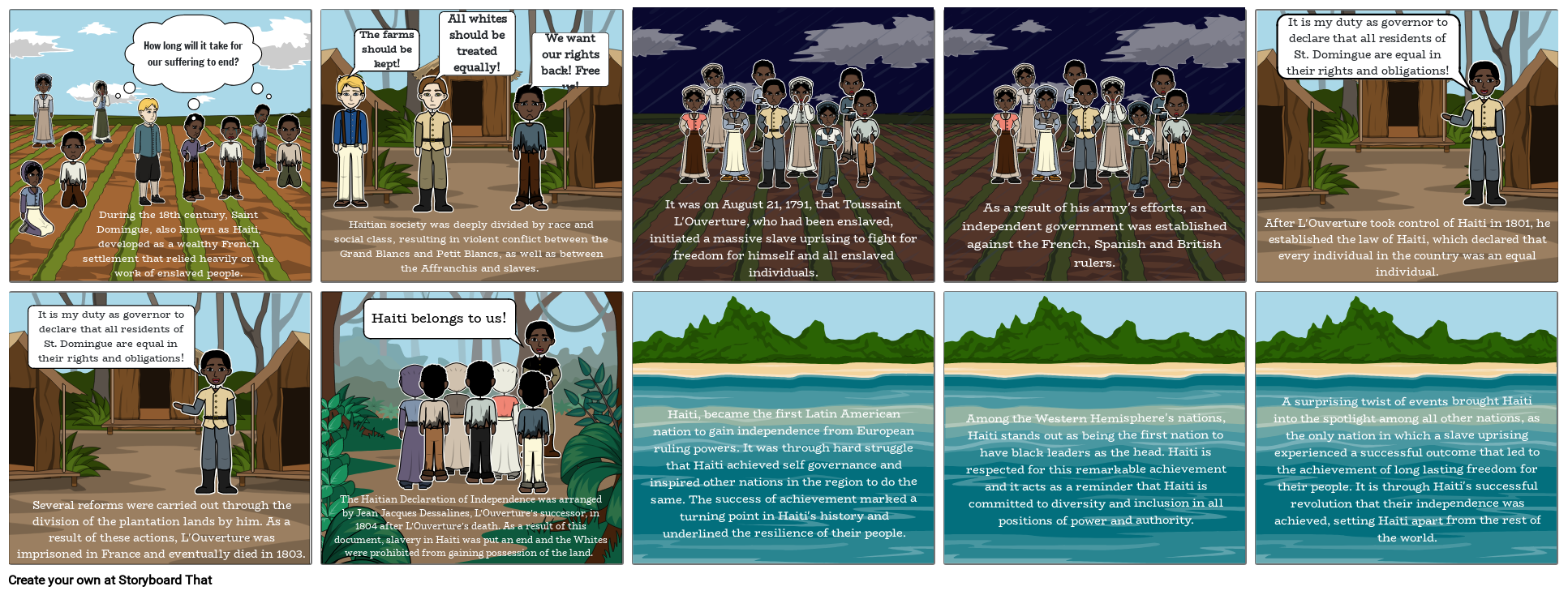Storyboard: My Rebellion, Revolution or Reform

Storyboard Text
- Slide: 1
- How long will it take for our suffering to end?
- During the 18th century, Saint Domingue, also known as Haiti, developed as a wealthy French settlement that relied heavily on the work of enslaved people.
- Slide: 2
- All whites should be treated equally!
- The farms should be kept!
- We want our rights back! Free us!
- Haitian society was deeply divided by race and social class, resulting in violent conflict between the Grand Blancs and Petit Blancs, as well as between the Affranchis and slaves.
- Slide: 3
- It was on August 21, 1791, that Toussaint L'Ouverture, who had been enslaved, initiated a massive slave uprising to fight for freedom for himself and all enslaved individuals.
- Slide: 4
- As a result of his army's efforts, an independent government was established against the French, Spanish and British rulers.
- Slide: 5
- It is my duty as governor to declare that all residents of St. Domingue are equal in their rights and obligations!
- After L'Ouverture took control of Haiti in 1801, he established the law of Haiti, which declared that every individual in the country was an equal individual.
- Slide: 6
- It is my duty as governor to declare that all residents of St. Domingue are equal in their rights and obligations!
- Several reforms were carried out through the division of the plantation lands by him. As a result of these actions, L'Ouverture was imprisoned in France and eventually died in 1803.
- Slide: 7
- Haiti belongs to us!
- The Haitian Declaration of Independence was arranged by Jean Jacques Dessalines, L'Ouverture's successor, in 1804 after L'Ouverture's death. As a result of this document, slavery in Haiti was put an end and the Whites were prohibited from gaining possession of the land.
- Slide: 8
- Haiti, became the first Latin American nation to gain independence from European ruling powers. It was through hard struggle that Haiti achieved self governance and inspired other nations in the region to do the same. The success of achievement marked a turning point in Haiti's history and underlined the resilience of their people.
- Slide: 9
- Among the Western Hemisphere's nations, Haiti stands out as being the first nation to have black leaders as the head. Haiti is respected for this remarkable achievement and it acts as a reminder that Haiti is committed to diversity and inclusion in all positions of power and authority.
- Slide: 10
- Haiti became the first Latin American nation-state Haiti successfully liberated itself from European control and achieved self-rule. In terms of leadership, it stands out as the inaugural nation in the Western Hemisphere with black leaders. Additionally, Only in Haiti did a successful slave rebellion lead to permanent liberation, setting it apart from all other countries.
Over 30 Million Storyboards Created

